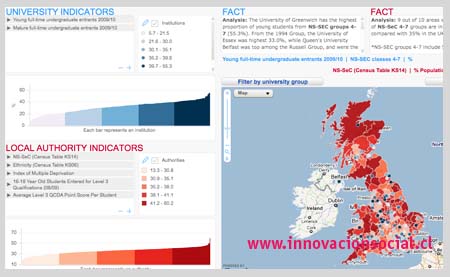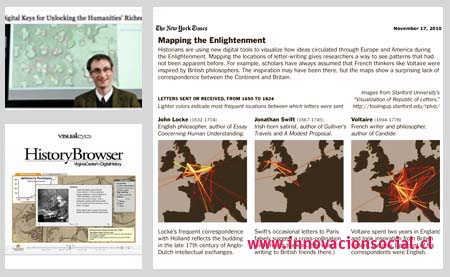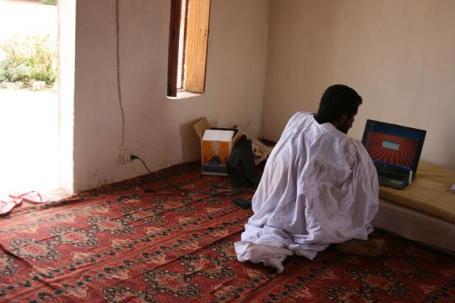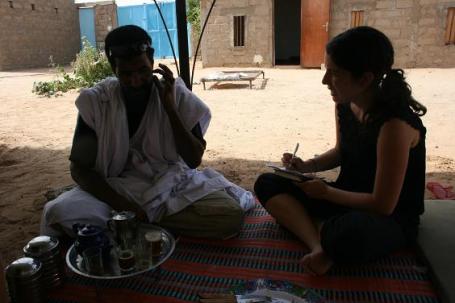Posts filed under ‘Internet’
Good Tools: Mendeley An Open Source/ Social Media Reference Manager
 Pic: Mendeley’s Website Screenshot
Pic: Mendeley’s Website Screenshot
Many of the graduate students, as they leave school, they have to leave behind the subscriptions to things like their “Reference Management Software” (End Note, RefX, etc). My advice, after going through my doctoral studies is: DO NOT USE LICENSED BASED REFERENCE MANAGEMENT SOFTWARE! It is most likely that you will end up switching jobs, countries, universities or even migrating from your computer operating system. Even though for some of these licensed software have some web based components, their penetration in particular communities depends if someone is sponsoring the license payment or not.
Even though I started using a licensed software at the beginning of my PhD program at NC State, I opted to try out Mendeley, a web-based reference manager that entails social media tools to connect with other researchers on the web. Mendeley provides you with a desktop tool where you can just drag and drop papers in order to have a copy in your reference manager. It also allows you to highlight (mainly the actions that Acrobat PRO provides) and write notes in the document that you can later access in your smartphone, tablet or computer. You can also join other researchers in groups of interest where you share bibliographic references online. Not everything is perfect in Mendeley though. There are issues on their importing plug in for Firefox and other small issues. But it is a pretty amazing FREE TOOL (Open Source) that you can use in your endeavors or with educating young researchers or students into better practices for working with bibliographic references.
Data to people: London data store, freeing data for social purposes like education
 As mentioned in previous posts like the one on “opening raw data”, concept that was put forward by Tim Berners Lee in his Ted Talk: “The Year the Data went Worldwide”[2010] and made real by institutions like Google with their Google Public Data Explorer ; there are public institutions like the Greater London Authority [GLA] that have started the quest of freeing their data to democratize the utilization of it. They indicate that their intention is not only to make data accessible to the public sector but to common citizens, or “netizens” [Hauben, “Netizens: on the history and impact of Usenet and the Internet” 1997], which entail those networked online citizens that are avid to make changes on their communities over the web. This is a frequent concept in magazines like “The Economist“, when they refer to the empowerment of oppressed communities through the social networking. Nonetheless, empowerment comes to anyone when looking to freeing data to the people.
As mentioned in previous posts like the one on “opening raw data”, concept that was put forward by Tim Berners Lee in his Ted Talk: “The Year the Data went Worldwide”[2010] and made real by institutions like Google with their Google Public Data Explorer ; there are public institutions like the Greater London Authority [GLA] that have started the quest of freeing their data to democratize the utilization of it. They indicate that their intention is not only to make data accessible to the public sector but to common citizens, or “netizens” [Hauben, “Netizens: on the history and impact of Usenet and the Internet” 1997], which entail those networked online citizens that are avid to make changes on their communities over the web. This is a frequent concept in magazines like “The Economist“, when they refer to the empowerment of oppressed communities through the social networking. Nonetheless, empowerment comes to anyone when looking to freeing data to the people.  The London Data Store is an interesting platform that combines the benefits of crowdsourcing or grouping social intelligence to understand huge social problems, with a friendly visual interface that allows the users to understand and negotiate thesis that can raise from diverse data connection. It also provides the grounding to “make questions to the data” in different ways, and to put it forward to resolve social issues. One example of this is the mapping of the “under representation of certain groups in higher education”, which combines statistical data with geographical mapping coming from a GIS platform.
The London Data Store is an interesting platform that combines the benefits of crowdsourcing or grouping social intelligence to understand huge social problems, with a friendly visual interface that allows the users to understand and negotiate thesis that can raise from diverse data connection. It also provides the grounding to “make questions to the data” in different ways, and to put it forward to resolve social issues. One example of this is the mapping of the “under representation of certain groups in higher education”, which combines statistical data with geographical mapping coming from a GIS platform. 
If we do it, we want others to do it too, says the GLA: “GLA is committed to influencing and cajoling other public sector organisations into releasing their data here too”. This is a first step to a greater democratization of social innovation.
DiRT-Open Source Digital Research Tools-Wiki
The Humanities are going through big changes. They no longer can stay confined to the “Analog World”. Acknowledging this situation, is that the Digital Research Tools Wiki [DiRT] project is built. The Wiki sets the platform to collect information and resources for conducting research within digital environments. It mainly indicates the use of open source tools that can enable the delivery of better and more creative ways to describe, interpret, analyze and display data specially for the humanities. WE LOVE OPEN SOURCE! Open source has various benefits, but one of the most relevant of them is the technological non-obsolescence derived from market constraints.
SOME OF THEIR TOOLS
Is Google making us stupid? How the Internet is changing us….
 Pic: Students playing video games at NCSU Library [CM]
Pic: Students playing video games at NCSU Library [CM]
There is a lot of information on the benefits of adopting new technologies. It is no surprise that the computer helps us manage cognitive loads or limitations that we have as humans. Computers could be considered cognitive artifacts, Norman says: “those artificial devices that maintain, display, or operate upon information in order to serve a representational function and that affect human cognitive performance.” [Norman 1991, p.17] But, today, are computing technologies really contributing to our cognitive skills? In his new book “The Shallows: What Internet is doing to our Brains” , Nicolas Carr places upfront the facts behind an early adoption of Internet. How Internet shapes human thought becomes evident. Are we losing our ability to read and think deeply because of the Internet?
 Pic: Apple Store NYC [CM]
Pic: Apple Store NYC [CM]
In May 2004, Wired Magazine published an article talking about how Internet rewired our brains. Experiments to monitor brain activity with an MRI, done by Gary Small [UCLA] p showed that Brain activity of the experienced surfers was far more extensive than that of the newbies, particularly in areas of the prefrontal cortex associated with problem-solving and decision-making. “Five hours on the Internet and the naive subjects had already rewired their brains,” Small (more…)
Digital Humanities: The dialogue between the Geeks and the Poets
 PIC: NY Times
PIC: NY Times
Not long ago, the NY Times published the article: “Digital Keys for Unlocking the Humanities’ Riches”. The article mentions the technological exploration of data coming from the humanities under an alliance between what Patricia Cohen calls: The Geeks and the Poets. Upfront, Cohen faces the audience with a bold statement when using the word: unlocking. This idea is pretty strong. The knowledge coming from the humanities seemed to have been “locked”, being a privilege reserved for some savvy scholars.
Today, we live in an era where we, simple individuals, have become very sensible for information. And this seems to be an increasing trend for about fifteen years now. With the rise of the open source technologies and the availability of raw and public data on the net, every human has the right to take well-informed decisions. In another article from the NY Times “A Data Driven Life” Gary Wolf explores the idea of ordinary individuals getting interested in plain data. I make this link in order to intensify my idea that, today, broader audiences are interested in being well informed. This information can be personal tracking for taking decisions, or simply going to “shop” for information on the web. There is a phenomenon of “Data Democratization” happening and the humanities can’t be left behind. (more…)
Public Data Explorer Google- Open public data for decision making
 PIC: Image from Google Public Data Explorer.
PIC: Image from Google Public Data Explorer.
There is already a lot of research in the social sciences [statistical orientation] that yields raw data for further analysis and decision making. Thanks to the exponential growth of the Internet, there is plenty of this data available for us, simple mortals, to use for answering our own research questions. This type of data has also the potential to be used for decision making in the realm of public policies. In a previous post, we had talked about Hans Rosling and his “Gapminder” , an interactive tool for statistical data exploration [structured data]. Today, I would like to put upfront the example of the Public Data Explorer from Google. Not too late ago, Google bought “Trendalyzer”, a data analysis tool from Gapminder and made this tool even more public. Ola Rosling, Hans’ son, talks about the tool in the following video:
But not only that, the abilities of this new “Public Data Explorer” allows common individuals to explore easily large public data sets [coming from: UN, OECD, WORLD BANK, ETC] by giving them as a default, tools to visualize and communicate this information interactively. Data becomes more accessible and universal. Give it a try.
Small tourism entrepreneur in Mauritania: What Internet and viral sites like Facebook can do cheaply for these businesses
 Down in the deepest of Mauritania, we met Sid Ahmed Nemoud. A man that knows what he is doing when it comes to entrepreneurship. Yet, here in Atar, it hasn’t been that easy. He owns the camping an Auberge “Inimi” located in the Adrar, the most important desert area of Mauritania. I decided to interview him in order to point out different ideas of “service and experience” design; that can be relevant for small entrepreneurs. Secondly, I wanted to highlight the idea of what viral media and Internet can do for small entrepreneurs in rural areas by opening markets that are not always near or easy to penetrate. Design has a say in this type of things, and we have to acknowledge it in order to achieve social innovation in a partnership with the local communities.
Down in the deepest of Mauritania, we met Sid Ahmed Nemoud. A man that knows what he is doing when it comes to entrepreneurship. Yet, here in Atar, it hasn’t been that easy. He owns the camping an Auberge “Inimi” located in the Adrar, the most important desert area of Mauritania. I decided to interview him in order to point out different ideas of “service and experience” design; that can be relevant for small entrepreneurs. Secondly, I wanted to highlight the idea of what viral media and Internet can do for small entrepreneurs in rural areas by opening markets that are not always near or easy to penetrate. Design has a say in this type of things, and we have to acknowledge it in order to achieve social innovation in a partnership with the local communities. 


